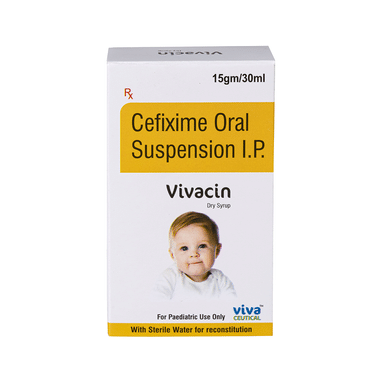-
Topcef 50 DS Dry Syrup (Combipack) (Rs.51.21)
Composition: Cefixime (50mg)
-
Sefzee 50mg Dry Syrup (Rs.42.19)
Composition: Cefixime (50mg)
-
Raxicef 50mg Dry Syrup (Rs.20.63)
Composition: Cefixime (50mg)
-
Reethy 50mg Syrup (Rs.44.06)
Composition: Cefixime (50mg)
-
Rxfix 50mg Dry Syrup (Rs.45.94)
Composition: Cefixime (50mg)
-
Syfix 50mg Tablet (Rs.45.28)
Composition: Cefixime (50mg)
-
Rafloxim 50 Dry Syrup (Rs.45.94)
Composition: Cefixime (50mg)
-
Pacxim 50mg Oral Suspension (Rs.50.63)
Composition: Cefixime (50mg)
-
Pinex 50mg Tablet (Rs.51.56)
Composition: Cefixime (50mg)
-
Popcef 50mg Dry Syrup (Rs.49.98)
Composition: Cefixime (50mg)
All Details About Vivacin Oral Suspension
Find out detailed description, uses, directions of use, side effects, warnings and precautions, frequently asked questions about Vivacin Oral Suspension
Description:
Vivacin Oral Suspension is an antibiotic medicine. It is commonly given to children to treat a wide range of bacterial infections targeting the ear, eyes, nose, throat, lungs, skin, gastrointestinal tract, and urinary tract. It can also be used in treating uncomplicated typhoid fever in children and adolescents.Vivacin Oral Suspension is best given an hour before or two hours after meals as that ensures better absorption. In case your child develops a stomach upset, prefer giving it with meals. The dose and duration depend upon the type and severity of the infection, so stick to the dose, time, and way prescribed by the doctor. If your child vomits within 30 minutes of the intake, give the same dose again but do not double dose if it's the time for the next dose.
Do not give this medicine to your child in case of cold and flu symptoms as they are usually caused by viruses, and antibiotics don’t treat viral infections. Doctors prescribe this medicine for cough and cold only when they detect any underlying secondary bacterial infection.
This medicine may have some minor and temporary side effects such as diarrhea. Usually, these episodes subside once your child’s body adapts to the medicine. However, if these side effects persist or become bothersome for your child, report to the doctor without any delay.
Narrate your child’s complete medical history to your child’s doctor, including any previous episode of allergy, heart problem, blood disorder, birth defects, airway obstruction, lung anomaly, gastrointestinal problem, skin disorder, liver impairment, and kidney malfunction. This information is critical for dose alterations and for planning your child’s overall treatment.
Directions For Use:
Take this medicine in the dose and duration as advised by your doctor. Check the label for directions before use. Measure it with a measuring cup and take it by mouth. Shake well before use. Vivacin Oral Suspension may be taken with or without food.Side Effects:
Vivacin Oral Suspension does not pose serious side effects and is well-tolerated by children. In case the side effects do occur, they’re likely to subside once the body adapts to the medicine. Consult your child’s doctor if these side effects persist or bother your child. The most common side effects include-Ordinary side effects of Vivacin
- Soft stools
- Diarrhea
Warning & Precautions:
However, consult with your child’s doctor before giving Vivacin Oral Suspension to your child in case of a severe form of liver disease.
FAQs:
What if I give too much of Vivacin Oral Suspension by mistake?
Are there any possible serious side effects of Vivacin Oral Suspension?
Can other medicines be given at the same time as Vivacin Oral Suspension?
Can I get my child vaccinated while on treatment with Vivacin Oral Suspension?
Which lab tests may my child undergo while taking Vivacin Oral Suspension on a long-term basis?
The mucus coming out of my child’s nose is yellow-green. Is it a sign of a bacterial infection?
Does a common cold caused by viruses always result in a secondary bacterial infection? When to start an antibiotic to prevent infection?
Can Vivacin Oral Suspension impact my child’s digestive system?
Can Vivacin Oral Suspension lead to bacterial resistance in my child?
How long should I take Vivacin Oral Suspension?
Written by:
Dr. T. Sharmila Krishna
M.B.B.S., MD (Biochemistry)
Reviewed by:
Dr. Sureshbabu Yadav
M.B.B.S., DIP.DIAB, F.R.S.H
Disclaimer:
Getomeds primary intention is to ensure that its consumers get information that is reviewed by experts, accurate, and trustworthy. The information and contents of this website are for informational purposes only. They are not intended to be a substitute for professional medical advice, diagnosis, or treatment. Please seek the advice of your doctor and discuss all of your concerns about any disease or medication. Do not disregard or postpone seeking professional medical advice because of something you read on Getomeds. Our mission is to support, not replace, the doctor-patient relationship.
